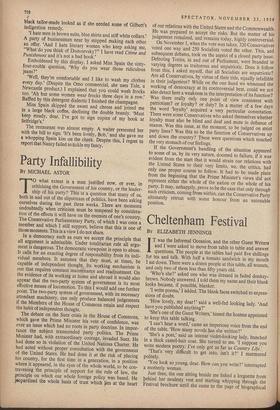Party Infallibility
BY MICHAEL ASTOR TO what extent is a man justified now, or ever, in criticising the Government of his country, or the leader- ship of his party? This is a question that many of us, both in and out of the slipstream of politics. have been asking ourselves during the past three weeks. There are moments undoubtedly when criticism must be tempered by considera- tion of the effects it will have on the enemies of one's country. The Conservative Parliamentary Party, of which I was once a member and which I still support, believe that this is one of those moments. This is a view I do not share.
In a democracy such as ours we accept the principle that all argument is admissible. Under totalitarian rule all argu- ment is dangerous. The democratic viewpoint is open to abuse. It calls for an exacting degree of responsibility from its indi- vidual members. It assumes that they must, at times, be capable of independent thought. Its working mechanism is one that requires constant maintenance and readjustment. On the evidence of its working at home and abroad it would also appear that the two-party system of government is its most effective means of locomotion. To this I would add one further point. The two-party system of government, with its necessary attendant machinery, can only produce balanced judgements if the Members of the House of Commons retain and respect the habit of independent thought.
The debate on the Suez crisis in the House of Commons, which gave the Prime Minister his vote of confidence, was over an issue which had no roots in party doctrine. In impor- tance the subject transcended party politics. The Prime Minister had, with extraordinary courage, invaded Suez. He had done so in violation of the United Nations Charter. He had acted without proper consultation with the government of the United States. He had done it at the risk of placing -his country, for the first time in a generation, in a position where it appeared, in the eyes of the whole world, to be con- travening the principle of support for the rule of law, the principle on which our whole foreign policy was based. He jeopardised the whole basis of trust which lies at the heart of our relations with the United States and the Commonwealth. He was prepared to accept the risks. But the matter of his judgement remained, and remains today, highly controversial.
On November 1, when the vote was taken, 320 Conservatives voted one way and 250 Socialists voted the other. This, and subsequent debates, took on the aspect of a closed party issue. Defecting Tories, in and out of Parliament, were branded in varying degrees as traitorous and unpatriotic. Does it follow from this, I asked myself, that all Socialists are unpatriotic? Are all Conservatives, by virtue of their title, equally infallible in their judgement? While on the one hand we witnessed the working of democracy at its controversial best, could we not also detect here a weakness in the interpretation of its function? Was there really only one point of view consistent with patriotism? or loyalty? or duty? In a matter of a few days the word 'loyalty' acquired a very particular connotation. There were some Conservatives who asked themselves whether loyalty must also be blind and deaf and mute in defiance of reason. Was this issue, at the moment, to be judged on strict party lines? Was this to be the function of Conservatives up and down the country? These were questions which touched the very stomach of our feelings.
If the Government's handling of the situation appeared to some of us, by its very nature, doomed to failure, if it was evident from the start that it would strain our relations with the United States to their very limits, we, the critics, bad only one proper course to follow. It had to be made plain from the beginning that the Prime Minister's views did not represent either the whole of the nation or the whole of his party. It may, unhappily, prove to be the case that only through such criticism, coming from within, can the Conservative Party ultimately retreat with some honour from an untenable position.










































































 Previous page
Previous page